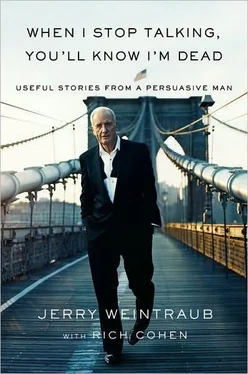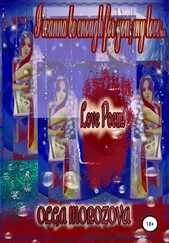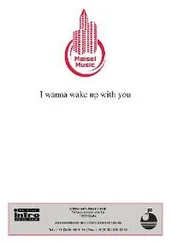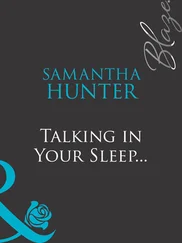"Don't worry," I told Bush. "I don't even want to go. Hammer dragged me here."
"I will call you when it's over," said Bush. "We'll have lunch at the Embassy."
"Great."
I hung up.
A minute later, the phone rang. It was Hammer. "Get dressed," he said, "I got you a ticket. We're going to the funeral."
It was a cold, bleak day. I got dressed and went down. Hammer was waiting with a car. We drove. The streets were gray cinder block after gray cinder block, same color as the sky. The people on the street looked gray, too. The Kremlin was surrounded by tanks and soldiers. When the car stopped, Hammer popped out as if he were on springs, handed me my ticket, and raced ahead. There was a checkpoint. When Armand went through, the soldiers saluted. When it was my turn, they started to talk in Russian, guns were pointed at me. I had a ticket, but it said "Florence Hammer"-Armand's wife. That is what set off the guards. I started shouting, "Armand! Armand!" It took a moment for him to hear me, to recognize his own name-he was getting old. Then he came back, pushed his way through, started talking to these guys in Russian. They calmed down as soon as they saw him, lowered their guns, apologized-not to me, to Armand.
We looked for our seats. It was like a Yankees game, when you keep getting closer and closer to the field and wonder, Jeez, who does this guy know, how good are these tickets going to be? We were on the carpet, a dozen feet from the casket, sitting with Castro, Qaddafi, and Arafat, all my favorites. The Politburo marched past me, the generals and the Red Army band. I was on all the broadcasts. As I scanned the crowd, bored, looking for familiar faces, I spotted Bush and Shultz and the rest in back, hands in their pockets, pinched by the cold and the indignity of bad seats. (The Russians did not want them to be shown on TV, so they stuck them far away from the cameras.) When I spoke to Bush later, he seemed genuinely amused. "What happened?" he said, laughing. "First I hear you're not going, then I see you, not only at the funeral but basically seated inside the coffin."
What a day! It was like stumbling into a history book. After the service, a Russian big shot came over and said, "Dr. Hammer, we want you and Mr. Weintraub to please come with us to the tomb to say good-bye to the premier before we put him in the wall."
We were taken to the wall of the Kremlin, where they buried the big shots. The world press was there. In front, it was just me, Hammer, a few Russians, and the casket. The Russians took hundreds of pictures of Hammer and me posed with the box. Each time, before the flash went off, Hammer broke into a big smile. It was his instinct. Don't let the cameras catch you looking morose! I finally said, "Hey, Armand, did you forget? Your friend died."
People age in different ways. Some go on and on, while others drop off the table. One day they are a hundred percent themselves, the next day, even if their body is still walking, a crucial piece is gone. Armand progressed like a western sunset, each moment deepening the beauty that had only been suggested in the afternoon. His pace quickened, as if he wanted to get as much as possible done, as if he wanted to finish strong. We took one of our last trips in 1984, to the Olympics in Sarajevo. We had no plans to go. Like much else with Armand, the decision was made all of a sudden, and for no reason at all. He just wanted to travel, see, experience.
"You can't just go to the Olympics," I told him. "There are no tickets, no hotels. People have been planning this trip for three years."
"Pack your bags," he said. "We're going to Sarajevo. That's where the action is."
"When do you want to go?" I asked.
"Now," he said. "Meet me at the plane."
He owned a 727, with the cabin divided into two two-bedroom suites. I used to bring a few bottles of Chateau Lafite and a bucket of Kentucky Fried Chicken. Armand loved that. He had a chef on the plane, but on most of our trips all he did was put the chicken on plates and pour the wine.
It took forever to reach Sarajevo. Hammer was eighty-four years old. The trip exhausted him. He had made no plans, no reservations, nothing. Instead, when we were an hour out, he called the president of Yugoslavia and said, "We need rooms."
"Don't worry, Dr. Hammer," said the president. "I'll take care of it."
Hammer had convinced the president that he, Hammer, would dig for coal and drill for oil, so the president would do just about anything to make him happy.
We were met at the airport by a parade of limousines and police cars, which took us to Tito's ski chalet in the mountains. (Tito had died a few years before, but his name was still spoken with great reverence.) The road climbed in switchbacks, each turn opening on a monster view of dark hills and yellow lights. It felt like we were going to the top of the world. The chalet was a palace, hundreds of rooms and galleries. We unpacked. A banquet had been arranged to honor Dr. Hammer. Now bear in mind, it was one o'clock in the morning. We were wiped out, sitting at this long table as they brought out the food-stag, grouse, a wild grub-eating boar with an apple in its mouth, the last thing in the world a Jew wants to see. They cut into its flank, shaved off strips of belly meat, fat pooling and glistening on the plate. Everybody was passing around fizzy, pale beer, making toasts, and Armand had his chin on his chest, head down.
"Do you want I should wake him?" one of the diplomats asked me.
"Nah," I said. "Let the man rest."
We finally went up to bed. I got under the covers, closed my eyes, started to doze, an American Jew surrounded by black, Slavic peaks. Then, just as I started to dream, there was a vicious banging on my door. It was scary as hell, coming in the dead of night, like a summons by the Gestapo: Send out the Juden! I sat up in bed, confused, wondering: Who am I? Why am I here?
"Yeah, who the hell is it?" I asked.
"It's Armand. Get packed. We're moving."
I went downstairs. There was a guard of fifty soldiers watching us, each man armed to the teeth. "There's a storm blowing in," Armand explained. "If we don't get out now, we'll be stuck here and miss the opening ceremonies of the Olympics. We can't miss the opening ceremonies. That's where the action is."
We drove back through the passes, the storm closing in behind us.
Armand was on the phone the entire way. He called every hotel in the city but could not find a room, so he called the president, got him out of bed. "We need help," said Armand. "We don't know where we're going." A palace was found in the middle of the city. It was filled with diplomats. It was completely packed, but no problem. The president kicked everyone out, ambassadors and diplomats were awakened in the dead of night and told to pack. I saw them in the halls, one shoe on, shirtsleeves hanging out of suitcases. I was given a suite of rooms on a high floor. I could see distant blue mountains over the red rooftops of the city. My living room was a ballroom, the bathroom was bigger than my house in LA. It was a fairy tale.
The next day, at the opening ceremonies, we sat with the president. It was like every other trip I'd taken with Hammer: going to be going, big wheels and diplomats, sleeping through banquets and toasts. We attended the opening ceremonies of the Games, went to some of the contests. Well, I assume we did. I don't really remember. With Armand, the event was always less interesting than the show. He wanted to be in the action, to see and be seen. He made a study of human drama-it was his life's work. He was fascinated by everyone, high and low. He wanted to find out everything. He had a special interest in charisma and power, in great men, the special few who worked their will on history. Hammer participated, but he also observed. In this, he exhibited a kind of active detachment. He was in the game but removed from the game, playing and watching himself play. He made a spectacle of himself but enjoyed watching that spectacle. He did that his entire life, until he was sick and old.
Читать дальше

![Сьюзан Кейн - Quiet [The Power of Introverts in a World That Can't Stop Talking]](/books/33084/syuzan-kejn-quiet-the-power-of-introverts-in-a-wo-thumb.webp)










